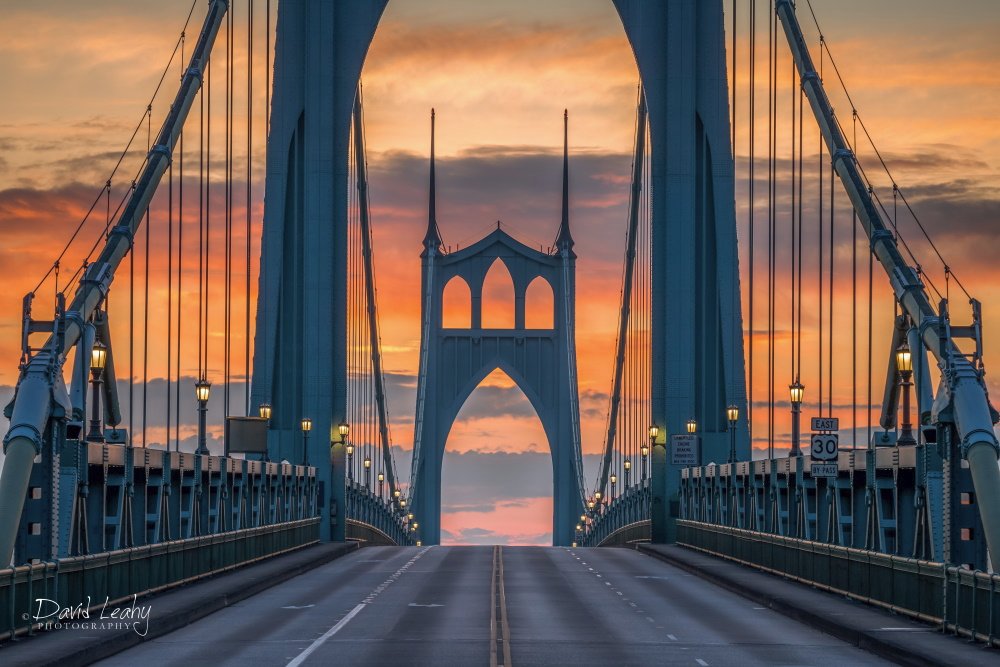The Daily Escape:

St. John’s Bridge, Columbia River, OR – June 2022 photo by David Leahy
In The American Prospect, Alexander Sammon asks a really big question: Why Are Police So Bad at Their Jobs? Sammon points out:
“Cops nationwide can’t stop crimes from happening or solve them once they’ve occurred.”
According to data published by the FBI, the rates at which police forces are solving crimes are at historic lows. In the case of murders and violent crime, clearance rates have dipped to just 50%, a startling decline from the 1980s, when police cleared 70% of all homicides.
We know that murders have increased since 2019, and violent crime (broadly defined), has also inched up over the same period. OTOH, property crimes are down, contrary to what Republicans and their Party’s news outlets would have you believe when they obsessively show videos of LA, San Francisco, and Portland.
And all crime, including the murder rate, remain well below 1990 levels. Sammon points out that crime today is much more distributed geographically than before. It used to be that Los Angeles and New York accounted for 13.5% of all murders nationally; now it’s only 4%.
While crime clearance rates have dropped to all-time lows, police budgets have reached all-time highs. In the business world, we would say that the marginal dollar of investment is producing a negative return compared to the forecast. In the business world, that gets you fired. Sammon quotes University of Utah law professor Shima Baradaran Baughman:
“Increases in police officers or police budgets have not been shown to reduce crime or make us safer.”
And clearance rates can be easily manipulated. They are not a proxy for crimes that have been solved since they equate to arrests. More from Baughman:
“All they tell us is whether there has been an arrest made in a case…not whether that person is actually ….eventually convicted of the crime…”
He says that convictions are a better measure of whether a crime was actually cleared, and those numbers are substantially lower than the already abysmal national clearance rates.
The Guardian points out that proponents of increasing police budgets argue that more law enforcement is the solution to more violence. But Samuel Sinyangwe, a policy analyst who founded Mapping Police Violence and Police Scorecard, notes that:
“…fewer than 5% of arrests nationally are for serious violent crimes. And research has shown that when police forces expand, there are more arrests for low-level offenses…”
Since the 2020 Black Lives Matter demonstrations call for police budgets to be defunded, not a single major American city has slashed its police funding. In fact almost all of them have increased spending on their police forces. Biden released a budget proposal for an additional $30 billion in law enforcement and crime prevention efforts, including funding to put “more police officers on the beat”.
America needs to answer the question of why police departments haven’t been able to convert increasing budgets into more effective crime-solving.
Meanwhile, the Uvalde murders underscore police forces’ inability to prevent crime from happening and/or stop them in progress. We’ve been slow to get the real story from the local police, but it’s clear that the police response to the shooting in progress was shameful.
While record police budgets aren’t keeping crime from happening, there’s some evidence that more resources in investigative work might improve clearance rates. But today’s police budgets prioritize presence on the streets instead.
The problem is that police reform is really hard. There are what appear to be intractable cultural issues within departments. The police unions need to be brought to heel. More accountability is a necessity. And their relationships with the community are terrible. If you suggest that your town or city shift some law enforcement resources to support the social work aspects of the job (thereby freeing cops to focus on actual law enforcement), you will be accused of wanting to “defund the police”, and the idea will die.
Time to wake up America! Both Democrats and Republicans want police budgets to grow. But neither have any answers as to how incremental dollars will help make the police more effective at their jobs! Progressives have been scapegoated by Republicans for their anti-police funding attitudes, but they’re the only political group saying we shouldn’t continue throwing more good money at a failed solution.
It’s a fact that our police departments aren’t solving crimes, despite devoting larger and larger sums to them. And heavily policed communities have good reason to continue to mistrust police involvement, thereby also depressing case closure rates. Failing to solve crimes only adds to that; why would marginalized communities respect a police force that doesn’t do its job particularly well?
To help you wake up, watch and listen to Rob Hustle’s 2021 rap, “Call the Cops”. It’s a lyric video:

Can we add the political nature of those who prosecute crimes. So in addition to the corruption of the police, prosecutors (often elected) do 2 things – settle cases using bullying to force poor young men (mostly) to plea deal. For the rest they are more interested in showing that they are doing something than in really trying to work on patterns of crime. For patterns – much is done by non profits in large cities and is largely about black men who served their time trying get the next generation not to commit crimes.
There is little value for prosecutors to talk about prevention. So it simply does not happen. Worse still Republicans fire off the same rhetorical bombs and dems run for cover.